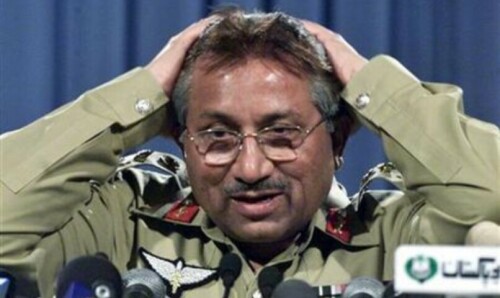Following in the footsteps of military strongmen Ayub and Zia, Pervez Musharraf, the ‘saviour general’ who directly ruled Pakistan, will be remembered for bringing the democratic process in the country to an abrupt halt. He served as ‘chief executive’ after the 1999 coup, then as military, and finally civilian, president before stepping down in 2008 as the sword of impeachment hovered over his head.
Musharraf violated the Constitution twice, earning the dubious distinction of being Pakistan’s only military ruler to be sentenced to death for high treason for imposing his second emergency in 2007. He was something of an enigma as his authoritarian rule was also interspersed with liberal reforms.
The Musharraf saga began on a note of high drama, as his flight from Sri Lanka was initially not allowed to land in Karachi. Subsequent events changed the course of Pakistan’s history. The army leadership staged a coup to remove the elected prime minister Nawaz Sharif and the latter was sentenced on charges of hijacking and terrorism.
Thanks to Saudi intervention, Mr Sharif and his family spent the next several years in exile in the kingdom, as Gen Musharraf became the master of all he surveyed. Some liberal sections had welcomed the coup out of concern at Mr Sharif’s increasingly conservative inclinations. But the general was in no hurry to leave, and appeared intent on leaving his ‘mark’. The events of 9/11 brought this region into the global spotlight once again, with the West more than happy to work with the general to achieve their goals in Afghanistan.
He created an atmosphere of liberalism in the country and started the process of accountability, though the latter proved to be a controversial exercise. He restored the joint electorate, gave a relatively workable LG system and liberalised the media ecosystem, but cracked down on the press during his second emergency. Despite his reputation as the man responsible for the Kargil debacle, he advocated for peace with India, helping to bring Pakistan and India the closest to a settlement on the Kashmir issue they had ever been.
Yet the late general’s mistakes were considerable, the biggest and most unforgivable being the derailing of the constitutional order. In order to survive politically, Musharraf formed questionable alliances with the PML-Q in Punjab and MQM in Sindh. Under him, the situation in Balochistan worsened — and is yet to normalise — after the killing of Akbar Bugti in 2006.
The transition from Gen Musharraf to Mr Musharraf was an unremarkable one as his All Pakistan Muslim League suffered the fate of most other one-man parties, slipping into oblivion after 15 minutes of fame. The Musharraf era holds numerous lessons for Pakistan’s ruling elite, civilian and military. All can learn from his many mistakes, as well as his successes.
Published in Dawn, February 6th, 2023














































